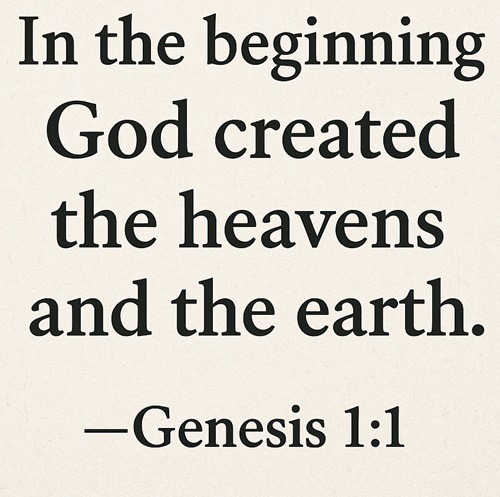
Genesis: “In the beginning God created the heavens and the earth”: A Detailed Exploration of What Genesis 1:1 Teaches About God
Few sentences in world literature carry as much weight as the first verse of the Bible:
“In the beginning God created the heavens and the earth.”
—Genesis 1:1
Genesis: With just ten words in English—and seven in Hebrew—this verse lays the foundation for the entire biblical worldview. It introduces God, His relationship to the universe, and the nature of reality itself. Below is a detailed exploration of what this single verse teaches about God.
1. God Exists Before All Things
The phrase “In the beginning” marks the starting point of time, matter, and the physical universe. The verse does not begin by arguing for God’s existence; it simply assumes it.
This implies:
-
God is eternal, existing before time.
-
God is uncaused; nothing comes before Him.
-
God stands outside the universe rather than being part of it.
In biblical theology, this positions God as the ultimate first cause and the foundation of all reality.
2. God Is the Creator of Everything
Genesis says God created “the heavens and the earth.” This is a Hebrew expression meaning the totality of everything—the entire cosmos.
This teaches that:
-
Nothing in creation is divine; only God is.
-
Everything—from galaxies to subatomic particles—owes its existence to Him.
-
Creation is intentional, not accidental.
The verse opposes ancient myths that described the world as emerging from chaos, cosmic battles, or accidents. Instead, the biblical God creates by sovereign choice and deliberate action.
3. God Is All-Powerful
Creating the universe requires unimaginable power. Genesis presents God not as a craftsman who struggles with raw materials but as one who brings the universe into existence by His will and later His word (“Let there be…”).
This reveals that:
-
God’s power is limitless (omnipotence).
-
No force competes with Him.
-
Creation itself is a demonstration of His authority.
4. God Is Personal and Purposeful
The verse does not describe an impersonal force or abstract principle. It presents “God” (Elohim)—a personal being who chooses, acts, and creates with intention.
This suggests:
-
God has a will and a purpose.
-
The cosmos is meaningful, not random.
-
Humanity’s existence is tied to a divine plan.
The personal nature of God becomes clearer in later passages, but even Genesis 1:1 hints that the Creator is not a distant abstraction but a purposeful being.
5. God Is Distinct From His Creation
Genesis 1:1 sharply distinguishes between:
-
God — the eternal, uncreated Creator
-
the heavens and the earth — the created universe
This counters two major ideas found in other worldviews:
-
Pantheism: God is the universe
-
Polytheism: gods emerge from the universe
Instead, Genesis teaches monotheism: one transcendent God who creates all things and is separate from them.
6. God Brings Order From Nothing
Although verse 1 is brief, its placement at the beginning of the creation narrative shows that God initiates order, structure, and meaning.
Later verses describe the creation of light, land, life, and humanity, showing that:
-
God is a designer rather than a chaotic force.
-
The universe reflects order, structure, and intention.
-
God creates not out of necessity, but out of sovereign initiative.
This sets the stage for the Bible’s consistent portrayal of God as a God of order, wisdom, and purpose.
Conclusion: A Universe Defined by Its Creator
Genesis 1:1 is not merely an introduction—it is a declaration of worldview:
-
God is eternal.
-
God is the Creator.
-
God is all-powerful and purposeful.
-
God is distinct from His creation.
-
The universe exists because God willed it.
In one verse, the Bible introduces a God who is both transcendent—existing beyond the cosmos—and imminently involved in its creation. Everything that follows in Scripture builds upon this foundation: a universe that begins with God, belongs to God, and ultimately finds its meaning in God.